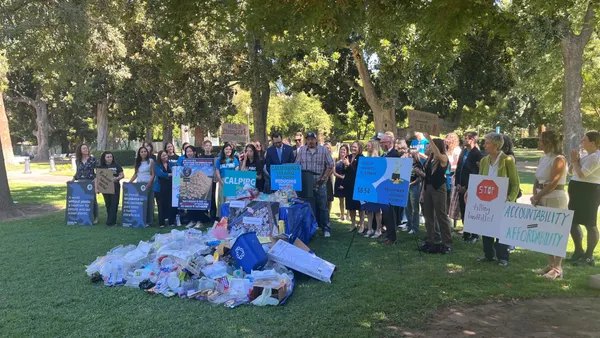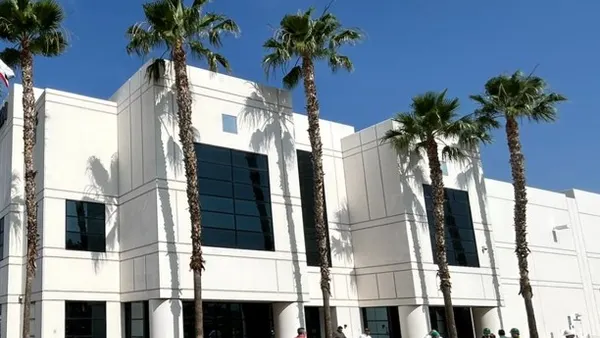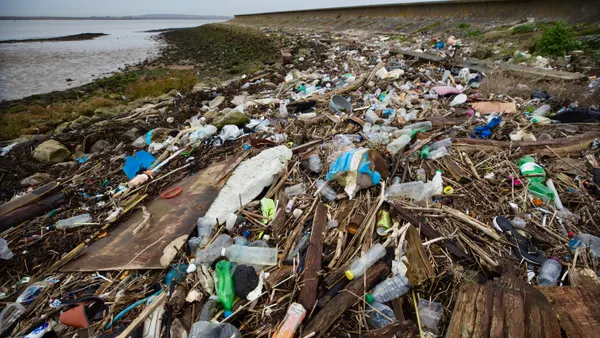UPDATE: California Gov. Jerry Brown signed AB 1158 into law on Oct. 14. This bill was passed with bipartisan support by the state legislature in September, with backing from carpet manufacturers such as Interface and Tarkett. The bill was also a priority for groups such as the National Stewardship Action Council, As You Sow and GAIA.
In 2014, carpet was estimated to account for about 1.8% of California's waste stream. Supporters of this new law anticipate that it will help divert more material from disposal and make progress toward the state's goal of reducing greenhouse gas emissions 40% by 2030.
Dive Brief:
- California's state legislature has passed a bill, AB 1158, that will update its carpet stewardship program if signed by Gov. Jerry Brown. The bill would set a 24% recycling rate goal for post-consumer carpet by 2020 and give CalRecycle the authority to set further goals every three years after that.
- The bill would also prevent manufacturers from using the current $0.25 per yard fee to pay for disposal or any other costs related to penalties for noncompliance. Groups such as the National Stewardship Action Council and Global Alliance for Incinerator Alternatives (GAIA) have raised concerns about these fees being used to fund carpet disposal in the current system.
- Other features of the bill include requirements for the state's Department of General Services to prioritize carpet recycling and the procurement of carpet with post-recycled content. The bill also includes provisions to increase grants for manufacturing more recyclable products, expand consumer education and create an advisory committee with a wide range of stakeholders — including the labor community.
Dive Insight:
Started in 2011, California's carpet stewardship program was hailed as the first of its kind in the U.S. and a model for what could be possible in other states. Though the fact that the program's recycling rate has only increased from 8% then to 11% in 2016 is seen as a sign of stagnation. Carpet America Recovery Effort (CARE), the industry group that manages the program, has pointed to a market shift from nylon carpet to less recyclable PET and a decrease in end markets as factors. Due to what CARE describes as increasing costs to run the program, the fee has been increased multiple times from its original rate of $0.05 per yard.
Yet CalRecycle has also fined CARE $3.3 million for failing to meet previous recycling targets and rejected their plans for how the program would run in future years. Restricting CARE from using consumer fees to pay that fine has been a top priority for the groups behind this bill and some concern remains that it might still happen before Brown makes a decision. Advocates see this bill as a good step, but would ideally like to see the system changed where manufacturers internalize costs rather than use consumer fees. Aside from carpet manufacturers Interface and Tarkett, which supported the bill, most companies in the state's carpet industry have either remained opposed or publicly silent on these changes.
One common concern is that the consumer fee will make carpet less competitive with other types of flooring. Though supporters of the program see that argument as disingenuous. They also point to new recycling facilities from companies such as XT Green and Aquafil as a sign that end markets will increase and improve options. Based on the long list of groups and local governments that endorsed AB 1158, and the large bipartisan margins by which the bill passed in the state's two legislative bodies, it remain popular. Based on Gov. Brown's environmental track record the hope is that he will agree with its merits.
Carpet recycling has become a more common focus for cities and states around the country. Like many materials recovered during construction or renovation projects, carpet has more value when collected separately, provided systems are in place to do so. Yet according to the Environmental Protection Agency more than 4 billion pounds of it end up as waste in the U.S. each year.










